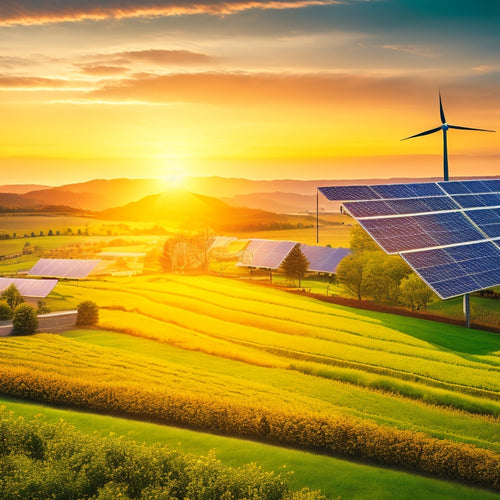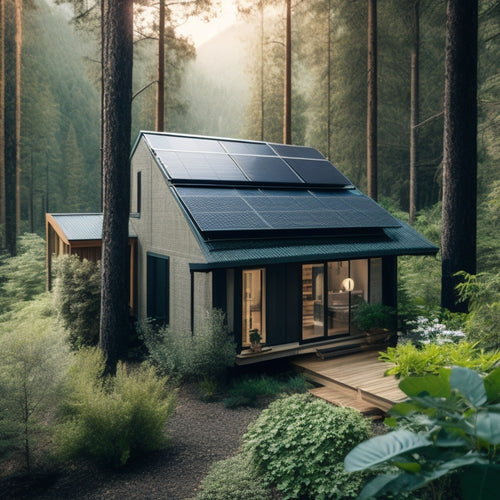
Best Portable Renewable Energy Sources for Off-Grid Living
Share
For off-grid living, your best portable renewable energy sources are solar panels and small wind turbines. Solar panels provide accessible and efficient power generation with minimal maintenance. They're affordable, especially with government incentives. Small wind turbines are great in breezy locations, offering reliable energy output. When choosing a system, consider your daily energy needs and look for options with strong storage capabilities. Combining these sources in hybrid systems can maximize energy production. With the right setup, you can achieve a sustainable lifestyle that meets your needs, and there's even more to investigate about optimizing your energy solutions.
At a Glance
- Solar Power: Portable solar panels provide efficient energy generation with minimal maintenance, ideal for off-grid living in sunny locations.
- Wind Turbines: Small-scale wind turbines can generate reliable energy in breezy areas, making them a great option for off-grid setups.
- Hybrid Systems: Combining solar panels and wind turbines maximizes energy generation potential, ensuring consistent power supply even in varying weather conditions.
- Battery Storage: High-capacity batteries are essential for storing energy, enabling users to access power during low generation periods.
- Cost-Effective Solutions: Government incentives and financing options make renewable energy sources more accessible and affordable for off-grid living.
Sustainable Energy for Independence
When you consider sustainable energy for independence, solar power stands out for its accessibility and efficiency.
Portable solar systems enable off-grid power generation anywhere, anytime, making them ideal for outdoor enthusiasts and remote workers.
Wind energy also offers significant potential, especially in areas with consistent breezes.
Together, these renewable sources can help you reduce reliance on traditional energy grids while contributing to a lower carbon footprint through eco-friendly technology.
Solar Power Advantages
Utilizing solar power offers numerous advantages that contribute to sustainable energy independence. One of the most significant benefits is the ability to capture abundant sunlight, allowing you to generate electricity without relying on traditional energy sources.
With advancements in solar panel technologies, you can now choose from flexible, portable options that fit your off-grid lifestyle, ensuring you remain powered wherever you go.
Solar energy benefits extend beyond mere power generation; they also reduce your carbon footprint and environmental impact. By opting for solar, you actively participate in combating climate change, promoting a cleaner, healthier planet for future generations.
Additionally, solar energy systems require minimal maintenance, meaning less hassle and more freedom for you to enjoy your surroundings.
Investing in solar power can lead to substantial long-term savings on energy bills. Once you've installed your solar panels, the sun's energy is free, allowing you to redirect funds towards experiences that matter to you.
Embracing solar power not only enhances your independence but also enables you to make a positive difference, ensuring you're not just living off the grid, but thriving in it.
Wind Energy Potential
Utilizing wind energy presents a powerful opportunity for individuals seeking sustainable energy independence. As you investigate this avenue, you'll find that recent wind energy innovations have made capturing wind more accessible than ever. Small scale turbines are ideal for off-grid living, providing a reliable energy source without the need for extensive infrastructure.
Here's a quick comparison to help you assess wind energy options:
| Feature | Small Scale Turbines |
|---|---|
| Power Output | 1 kW - 10 kW |
| Installation Cost | $2,000 - $5,000 |
| Maintenance Requirements | Low |
| Ideal Locations | Rural, Coastal, Open Areas |
Cost-Effective Energy Solutions
When considering cost-effective energy solutions, solar panels stand out for their affordability and accessibility.
These systems not only reduce reliance on traditional power grids but also provide long-term savings and increased property value.
Investing in wind turbines can also yield significant long-term savings, especially in areas with consistent wind.
Both options provide practical routes to sustainable energy without breaking the bank.
For more information on solar panel and battery kits, you can investigate the benefits they offer.
Solar Panel Affordability
How can you make solar energy work for your budget? The key lies in understanding solar panel financing options and utilizing government incentives.
Solar energy has become more accessible, allowing you to capitalize on its benefits without breaking the bank.
Many financing options are available, such as solar loans, leases, and power purchase agreements (PPAs). These alternatives let you install solar panels with little to no upfront cost, spreading payments over time while taking advantage of energy savings.
Look for local lenders who specialize in renewable energy financing to find a plan that suits your needs.
Moreover, don't overlook government incentives. Federal tax credits can reduce your overall costs considerably, and some states offer additional rebates and grants.
This financial support can make solar panel installation much more affordable, enhancing your off-grid living experience.
Wind Turbine Investments
Investing in wind turbines can be a smart move for those seeking cost-effective renewable energy solutions. By utilizing wind energy, you can reduce reliance on traditional power sources and promote sustainability.
There are various wind turbine types available, including horizontal-axis and vertical-axis turbines, each catering to different energy needs and locations.
When considering installation, it's essential to assess your site's wind conditions and select the appropriate turbine size. Look for models designed for your specific environment, whether it's residential or off-grid.
Installation tips include ensuring proper tower height for ideal wind capture and securing permits if needed.
To maximize efficiency, consider pairing your wind turbine with solar panels, creating a hybrid system that balances energy generation.
Don't forget to evaluate your budget and potential return on investment. While upfront costs might seem high, the long-term savings on energy bills can make your investment worthwhile.
In a world where energy independence is increasingly sought after, wind turbines offer a viable path to freedom from conventional power sources.
Key Specifications Uncovered
When choosing a portable renewable energy source, it's essential to evaluate the power output capacity, portability, and weight.
These specifications directly impact how effectively the device meets your energy needs while remaining easy to transport.
High-efficiency solar panels, for instance, can greatly enhance energy generation in off-grid environments, making them a popular choice among campers for high-efficiency monocrystalline panels.
Understanding these factors will help you make an informed decision that aligns with your lifestyle and energy requirements.
Power Output Capacity
Many portable renewable energy sources vary markedly in power output capacity, which is an important specification to take into account. When you're seeking energy independence, understanding the power generation potential of your chosen system is vital. These systems often range from a few watts to several kilowatts, depending on the technology used—solar panels, wind turbines, or portable generators.
You'll want to match the power output with your energy needs. For instance, if you plan to run essential devices like lights and laptops, a system with at least 300 to 600 watts is often sufficient. However, for larger appliances or multiple devices, you may need 1,000 watts or more.
Additionally, consider how the energy storage capabilities complement the power output. A strong energy storage system allows you to capture and retain the generated power, guaranteeing you have electricity during low-generation periods.
Look for battery options that can store at least 50% of the daily energy you plan to consume, providing flexibility and reliability. By carefully evaluating power output capacity alongside energy storage, you can secure freedom in your off-grid lifestyle.
Portability and Weight
Portability and weight are vital factors in selecting a renewable energy source that meets your needs. When you're living off-grid, every ounce matters. Lightweight materials are essential for guaranteeing that your energy source is easy to carry and set up. Look for products made from durable, yet lightweight components like aluminum or high-grade plastics. These materials not only enhance portability but also contribute to the longevity of your equipment.
A compact design is equally important. Equipment that folds or collapses saves space in your vehicle or storage area, allowing you to maximize your freedom during travel.
Solar panels, for example, have evolved into flexible, rollable versions that easily fit into tight spaces.
When considering your options, weigh the balance between power output and portability. A heavy, bulky generator might deliver strong energy but can quickly become an anchor rather than a liberating tool.
Aim for a renewable energy source that combines high efficiency with ease of transport. By focusing on lightweight materials and compact design, you'll guarantee that your off-grid excursions are as liberating as they're sustainable.
Selecting Based on Energy Demand
To choose the right portable renewable energy source, you'll first need to assess your daily energy needs.
Calculate the total wattage of the devices you plan to power and consider their usage duration. This information will help you select a system with the appropriate capacity to meet your demands effectively.
Additionally, incorporating energy-efficient upgrades can further reduce your overall consumption and enhance the performance of your renewable energy system.
Assessing Daily Energy Needs
When evaluating your daily energy needs, it's crucial to take into account both your consumption patterns and the devices you'll be powering. Start by listing all your essential appliances and tools, noting their wattage and how long you use each daily. This breakdown will give you a clearer depiction of your overall energy consumption.
Next, think about your lifestyle adaptation. Are you embracing minimalism or maintaining a more traditional setup? The choices you make will greatly influence your energy requirements. For instance, if you prioritize charging devices like laptops and phones, you may need to invest in a solar setup that accommodates higher energy demands.
Conversely, if you're focusing on basic needs like lighting and cooking, a smaller system might suffice.
Don't forget to factor in seasonal variations and daily weather patterns, as these can affect energy generation and consumption. By accurately evaluating your daily energy needs, you can make certain that the renewable energy sources you choose will meet your lifestyle demands, providing the freedom and independence you seek in your off-grid living experience.
Choosing Appropriate Capacity
Selecting the right capacity for your portable renewable energy system is vital for ensuring it meets your daily energy demands effectively. Start by calculating your total energy consumption using energy monitoring tools. This helps you identify how much power you need at any given time.
Once you have a clear understanding of your energy requirements, take into account the capacity of your battery storage. Your batteries shouldn't only store enough energy to cover your daily usage but also account for fluctuations in energy production. For example, if you're relying on solar panels, cloudy days can impact energy generation, so having extra capacity is essential.
Choose batteries that can handle your peak load while providing enough reserve capacity for emergencies.
It's also wise to take into account the efficiency of your energy system; a well-optimized system will reduce waste and maximize your available power.
Higher Energy Efficiency Ratings
When evaluating portable renewable energy sources, understanding energy efficiency ratings is essential.
You'll want to compare how effectively different sources convert energy into usable power for your needs.
Higher efficiency ratings often translate to more power output with less resource input, making your choice more sustainable and economical.
Energy Source Comparisons
Evaluating portable renewable energy sources requires a close look at their energy efficiency ratings. When considering options like solar panels, wind turbines, and hybrid systems, it's crucial to compare how effectively each system converts natural resources into usable energy.
For instance, solar panels often boast high efficiency ratings, especially when paired with quality battery storage solutions. This combination allows you to utilize energy during peak sunlight, storing excess for use during non-productive times.
Wind turbines present another viable option, though their efficiency can vary based on location and wind availability. In areas with consistent wind, they can outperform solar systems, especially when integrated into hybrid systems that combine both energy sources.
Battery storage plays a critical role in maximizing efficiency across all systems. High-capacity batteries guarantee you have access to energy when you need it, regardless of environmental conditions.
Ultimately, the most effective setup will depend on your specific energy needs, location, and lifestyle. By understanding these comparisons, you can make informed decisions that enhance your freedom in off-grid living.
Frequently Asked Questions
What Are the Best Portable Solar Panels for Camping Trips?
When choosing portable solar panels for camping trips, prioritize those with high solar panel efficiency and lightweight designs. These features guarantee you can easily transport them while maximizing power generation for your excursions.
How Do Wind Turbines Work for Portable Energy Generation?
Wind turbines convert kinetic energy from wind into electricity through rotating blades. Their efficiency depends on wind speed and design, making them ideal for portable energy applications, offering you freedom from traditional power sources while on-the-go.
Can I Use Portable Batteries With Renewable Energy Sources?
You can't put all your eggs in one basket, so using portable batteries with renewable energy sources is smart. Investigate different portable battery types for ideal charging efficiency to maximize your off-grid freedom and energy independence.
What Are the Environmental Impacts of Portable Energy Sources?
Portable energy sources can greatly reduce your carbon footprint, promoting resource sustainability. However, consider their production and disposal effects, as these can offset benefits. Choose wisely to guarantee minimal environmental impact while enjoying your freedom.
How Long Do Portable Renewable Energy Systems Typically Last?
Like a well-tuned engine, portable renewable systems can last years if you consider longevity factors. Regular maintenance tips, such as cleaning and inspecting components, can greatly enhance their lifespan, ensuring you stay powered wherever you roam.
Explore More
In the quest for off-grid living, utilizing portable renewable energy sources can be your ticket to energy independence. By choosing the right solutions customized to your energy demands, you're not just powering your home; you're lighting the way to a sustainable future. With the sun, wind, and water at your fingertips, you can change nature's gifts into reliable energy. Accept these innovations, and watch your self-sufficiency bloom like a flower in spring, lively and resilient.
Related Posts
-

Net Metering in Renewable Energy's Future
Net metering's future is vital for driving renewable energy growth and financial savings. You can reduce your electri...
-

Smart Home Thermostats to Revolutionize Your Space
Smart home thermostats revolutionize your space by providing precise temperature control and optimizing energy saving...
-

Off Grid Solar Batteries
As you shift to off-grid living, you'll rely on high-performance solar batteries to store excess energy generated by ...


